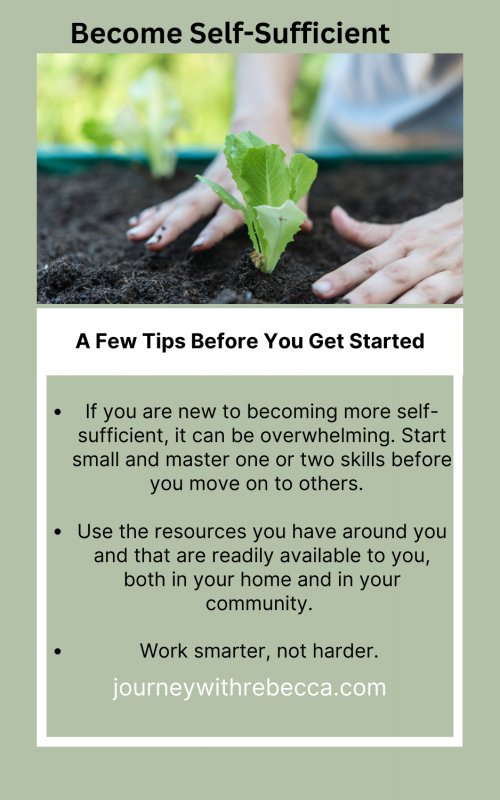
Ways to become more self-sufficient
Becoming more self-sufficient can be rewarding and can help you learn new skills!
What is self-sufficiency?

Self-sufficiency basically means that you are able to provide for yourself without help from any outside sources. This can look different for many people depending on how you incorporate this into your lifestyle. Some people are 100% self-sufficient, living off the grid and providing their own food for themselves. For others, this may mean that you grow some of your own food or use a rain barrel system to collect water. It all depends on your living situation and the resources available to you. The point is to rely more on yourself and less on the government or other people. It means being more resourceful and can require some skill.
Why You Should Become More Self-Sufficient
For starters, if you can become more self-sufficient it means that you have to depend less on others. We live in unstable times and words like depression, recession, inflation and unstable markets are all too familiar these days. Things can change overnight in the government which can trickle down to consumers in a bad way. Being self-sufficient is better for the environment. It also prepares you better for emergencies. When you come to rely on yourself more and gain more skills, it can boost your self-esteem.

Disclaimer: This section contains affiliate links, which means I may earn a small commission when you purchase through links on my site at no additional cost to you.
1. Grow a garden. You don’t have to be a master green thumb gardener or have a ton of space. Grow herbs in your kitchen year-round. Container and vertical gardens are great for people who are low on space. Growing your own food is very rewarding!
2. Participate in a community garden program. Many towns in my area are popping up with community gardens. Check your area to see if any are available. This is a great way to have your own plot to grow your own food.
3. Barter and trade produce. Use the resources of a community garden with the people who participate. Maybe the plot next to you grows cucumbers and you grow zucchini. Share your crops with one another or trade items.
4. Learn how to preserve your food. Canning, dehydrating, freezing and fermenting your food are all great skills to have. This can extend the life of your crops if you do have a garden. The Ball Complete Canning Book is a great resource if you plan on canning.
5. Save your seeds! If you grow a garden, save the seeds from your harvest. This saves you from buying starter plants or seeds. A great resource for learning how to save seeds is seedsavers.org.
6. Start a compost. This is great for the environment and cuts down on food waste. You do need a certain amount of knowledge as well when starting a compost. YouTube has plenty of great resources on how to compost with the correct ratio of greens to carbons.
7. Raise your own chickens, livestock or bees. This option will not be practical for everyone! If this is not feasible for you, buy things like eggs, honey and beef locally.
8. Hunt or fish for your own food. Again, not practical for everyone and does require a certain set of skills. Learning how to butcher or clean your hunts is another great self-sufficiency skill to have.
9. Collect rain water. Check your state and local guidelines before you start. There are local regulations put in place in some areas. You can even build your own rain barrel system to help save money.
10. Save water in other ways. Take shorter showers, turn the water off when you brush your teeth, collect the water that gets used when you are waiting for your shower to heat up. Everyone can do this one! As a bonus, use the water you save to water your house plants.
11. Join a CSA. CSA stands for community supported agriculture. This is a membership with a local farmer in your area. You pay up front for the growing season which helps the farmers get their crops growing. Once they harvest their crops, you get a portion of those each week.
12. Forage for your own food. You can find edible food right in your own yard! Just be 100% sure that you properly identify what you are foraging for. Make sure the things you forage have not been treated with chemicals and be sure to wash them properly before consuming.
13. Start using herbal remedies. Believe it or not, there could be medicine growing right in your yard! There are many health benefits to weeds such as dandelions that are growing in your yard. You can use dandelion greens in salads and tea. As a result, you may even rely less on the pharmacy. Make sure you are following herbal remedy guidelines. This book is one of my favorites.
14. Eat in Season Foods (From the Farmers Market). Eating foods that are in season and come from your local farmers market are likely to be cheaper than what you are finding in the grocery store. You can even stock up and preserve foods that are in season for later use when they are out of season.
15. Cut Your Monthly Expenses. There are many ways to keep money in your pocket! Pack a lunch, drink coffee at home, skip takeout meals and cook at home. Small changes in spending habits can add up to a big difference!
16. Pay down your debt. Save money and build your saving account by paying off debt and saving money on monthly interest.
17. Start meal planning. Make a menu and shopping list based off of your weekly meal plan. Look at store ads and use coupons for things you are planning on buying. Stick to your list and don’t shop hungry!
18. Make meals from scratch. You will have more control over the ingredients in your food, it is more nutritious and you can save money.
19. Learn How to Make Your Own Food. Many of the things you buy at the store such as cheese, yogurt and butter can be made at home with simple ingredients.
20. Make your own bread. This is a great skill to have. It can seem intimidating, but can be rewarding and cost effective.
21. Make your own household products. It is very easy to make your own detergents, soap, or even candles at home. The benefits of saving money and using natural products are so rewarding. This is good for both you and the environment.
22. Air dry your clothes. This is a great way to save money and become less dependent on outside energy. Hang a clothesline outside or get an indoor rack to put your clothes on. This saves on energy and costs.
23. Learn how to sew. Learn how to sew and mend your own clothing. You don’t need a sewing machine to mend your clothing, just a sewing kit. This is a great skill to learn.
24. Learn a trade. Learning how to do quick and easy car repairs can save you big bucks! Even just learning how to change the oil in your car can be a great skill to have.
25. Invest in solar panels or a generator. This is a bigger cost upfront, but can end up saving you a bunch of money in the long run. Having solar energy or a backup power source are great investments to make.
26. Find alternate transportation. Walk or bike when it is feasible to do so. Gas prices are still out of control and who knows what they will look like in the future. Save money and get in some exercise by using alternate transportation.
27. Stop using so many disposables. You can save on paper products by using linen napkins, use rags instead of paper towels and stop using paper plates. Invest in glass storage containers instead of cheap throw away containers.
28. Recycle, restore and upcycle. You can reuse, restore or recycle many items in your home. You can get creative with the items you reuse or repurpose.
ABOUT AUTHOR

Rebecca
Hello, I am Rebecca! I am so glad you are here on this journey with me! Here, I am sharing my passions including gardening, cooking, baking, crafting, natural living and so much more! In addition to the content I share on my YouTube page, I also write a blog.
It took a long time for the things I am passionate about to awaken within me. Now that they have, I am eager to share them with others.
Among the many things I am passionate about, gardening is one of them. In addition to gardening, I also enjoy different areas of art, crafting, photography and home project DIY.

RECENT POSTS


weighted Hula Hoop Challenge


